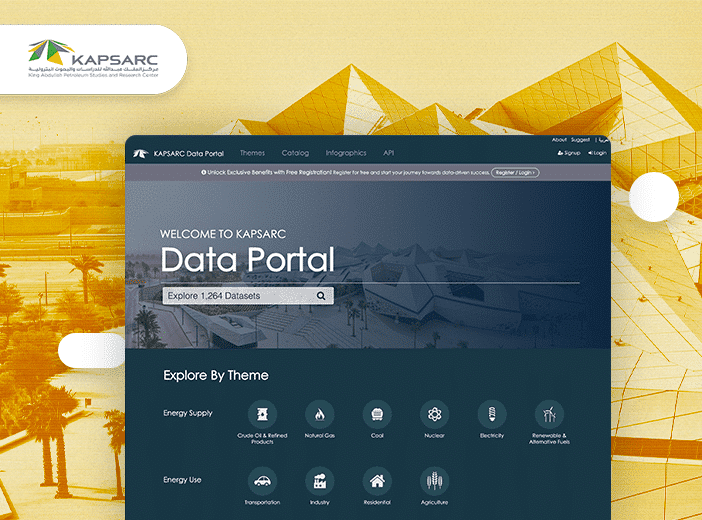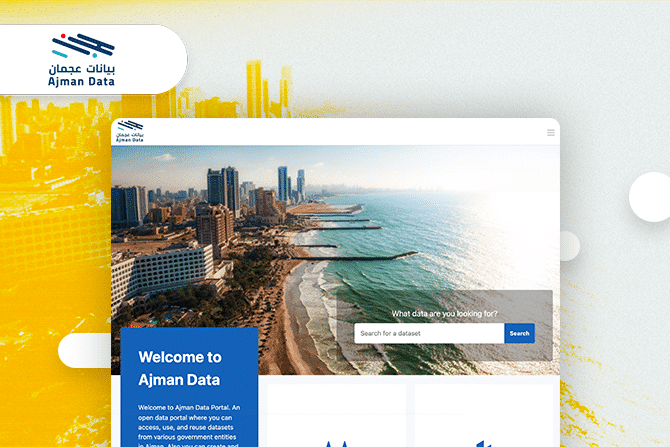The trends driving data portal growth in Saudi Arabia

The Kingdom of Saudi Arabia is undergoing enormous transformation, guided by its Vision 2030 plan. Data is key to building this new, digital-first economy - and our experiences at the LEAP technology conference highlighted the vital role of data portals to successful change.
The recent LEAP technology conference in Riyadh, Saudi Arabia, saw a record-breaking 215,000 attendees, demonstrating the enormous growth that innovation is driving across the Kingdom of Saudi Arabia (KSA). Data portals are a key element of this transformation as our conversations with customers, partners and prospects showed. Five major trends dominated the event, and underpin the country’s wider push towards data centricity.
The Saudi technology market is expanding rapidly
Driven by the Saudi government’s Vision 2030 plan, the country is transforming quickly through a wide range of projects across areas as diverse as transport, cities, tourism, healthcare and education. Riyadh itself is in the midst of enormous change, with new metro lines, green spaces, green transport options and the conversion of the old city into an open air museum all currently underway.
To deliver this change public and private sector organizations are investing heavily in technology, particularly around digitalization. This is attracting enormous interest from leading players in the market, with over $13.4 billion of investments announced during the event. Chief among these was Opendatasoft partner AWS’s $5.3 billion commitment to create an AWS infrastructure Region in KSA, which will launch in 2026.
This is mirrored by a strong focus on data, and data sharing, which is seen as key to digital transformation. Data portals, particularly around open data, are part of the roadmaps of all the organizations we spoke to, with a growing understanding of the importance of making access to data assets intuitive, rapid and seamless to encourage re-use.
Data sharing is being helped by clear data management standards formulated by the National Data Management Office (NDMO) of Saudi Arabia, linked to the Saudi Data and Artificial Intelligence Authority. The NDMO collaborates with various government entities to ensure a cohesive and comprehensive approach to data governance across the country.
The public sector is leading data and transformation efforts
Ministries and public bodies are all well-advanced in digitalizing their services and developing new, online ways to interact with citizens. The aim is to support transformation goals by making it simple and seamless to access government services, increasing user satisfaction, meeting changing needs, and improving efficiency.
Data is at the heart of this, providing the foundations for end-to-end processes that meet customer needs and save money. By making data available through open data portals, citizens are able to better understand organizational goals, increasing transparency and providing the ability to monitor progress against targets. Many public sector entities are already well-advanced with their plans to share data through portals, with a focus on strong data governance to ensure consistency, reliability and quality of data. They are also looking at how they can monetize data to deliver ROI and meet broader goals, such as sharing health data to improve research efforts.
Data is also being used to foster innovation and engage wider ecosystems, such as by underpinning innovation hubs, such as The Garage in Riyadh, which is attracting local and international startups. It is also increasingly critical to meeting (and reporting on) sustainability targets, sharing progress with the wider community.
Smart cities are crucial to delivering change
Saudi Arabia is committed to transforming its existing cities, as well as building completely new communities, such as the futuristic Neom development. Ensuring that these are focused on the needs of citizens, and are attractive, sustainable places to visit and live is driving investment in smart city technologies, across infrastructure, transport, monitoring, digital twin, and sensor technology. Digital transformation of urban areas is being supported by a range of bodies, from transversal agencies to local government and royal commissions, such as that for Riyadh itself.
Smart cities are built on the free flow of data across public sector bodies and with citizens, businesses and partners. Data portals are essential to delivering the right data, to the right people in the right format for their needs. That means providing compelling visualizations through open data portals to show current conditions, such as traffic flows, help visitors plan their journeys through detailed real-time tourist information, while giving an in-depth view of progress towards sustainability and other goals. Across the ecosystem partner portals can share relevant data with specific organizations, building strong, data-driven collaboration that enables innovation and new services, such as Mobility-as-a-Service offerings.
Internal data sharing is the next step
Currently most Saudi organizations are focusing on sharing data externally with partners, citizens and the wider community. However, the process of investing in data governance, collection, storage and publishing delivers benefits beyond open data portals. It provides the foundation for greater internal data sharing and underpins digital transformation and better, more informed, decision-making.
Building on open data portals, Saudi organizations are now beginning to look at how they can share data internally with all employees through intuitive portals. These break down silos between departments and increase collaboration, improve efficiency, reduce costs and enable better, data-driven decision-making. Given that data governance best practices have already been implemented, adding internal portals increases the ROI of programs and opens up new opportunities for innovation. We had multiple conversations with organizations looking to maximize their digital investment, build data cultures and focus the entire workforce around key goals (such as sustainability) through internal data portals in the future.
Artificial Intelligence is a key topic across all organizations
It’s no surprise that Saudi organizations are looking to support their transformation through artificial intelligence (AI). As with businesses across the world, they are focusing on how AI helps them deliver a better, more efficient service to customers, foresee and manage potential risk, uncover new opportunities and boost productivity.
Data is at the heart of successful AI. Without access to large volumes of reliable, high-quality data, Large Language Models (LLMs) will simply not be able to operate effectively. That puts the focus on ensuring that data is collected, processed and shared effectively, with the same data assets feeding data portals and AI models to benefit everyone equally.
At the same time, organizations are looking at how AI can transform their processes. For example, our new AI-powered search feature makes it simpler and faster for users to confidently find relevant data assets. As well as connecting them with what they are looking for, it also enables them to discover data which they may not be aware of, but which is relevant for their purpose, thus increasing reuse dramatically. In Saudi Arabia, the King Abdullah Petroleum Studies and Research Center (KAPSARC) has already tested our AI-powered search on its portal, enabling more conversational, question-based interactions that quickly provide users with the right data.
LEAPing into the future
The success of LEAP demonstrates the enormous, positive transformation happening across Saudi Arabia. Data is central to creating new digital experiences, inside and outside organizations and meeting the goals of the Vision 2030 plan. Making this data easily available to all audiences relies on intuitive, comprehensive data portals, underpinning greater data sharing and use and underpinning successful transformation.

One of KAPSARC’s key objectives is to produce internationally recognized applied research, tools and data to inform global policymaking on energy, climate and sustainability. As part of this, the center publishes several insightful publications every year, based on extensive research and the collection of energy data from sources across the globe. To meet its aims, it needed to be able to share this data internally and externally, enabling its simple, free reuse. KAPSARC understood that the optimal way to share the data its researchers had collected was via an online data portal. Learn more about Kapsarc’s open data in this success story!

One of the seven emirates that make up the United Arab Emirates (UAE), Ajman has a vision to deliver smart government services that improve the experience of its 500,000 residents and support businesses and other stakeholders through digital channels. The Department of Digital Ajman therefore began a project to collect and publish open data from government departments on its website. The open data portal Ajman Data is now one of the pillars of digital government across the emirate, providing key information to the local community, international investors, businesses and government departments. Learn more about this use case in our success story.
 Data Trends
Data Trends
How successful are governments at sharing their data with citizens and businesses? The latest Open Data Maturity report provides an overview of progress across Europe, and highlights the importance of improving data portals and measuring impact to future success


